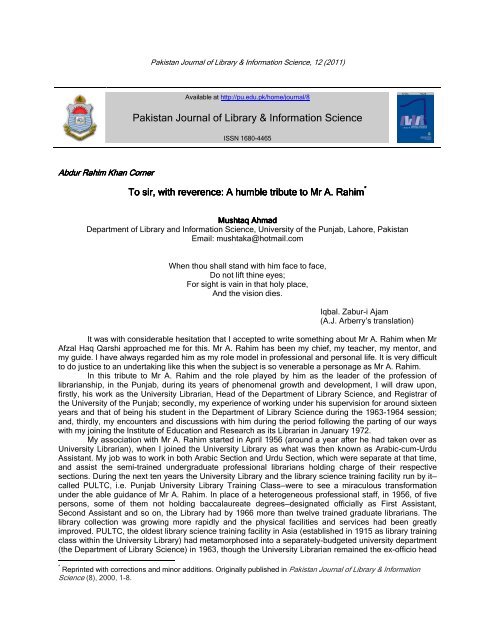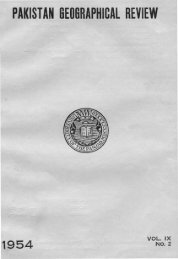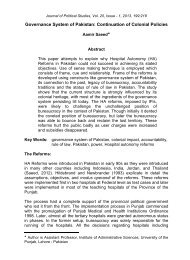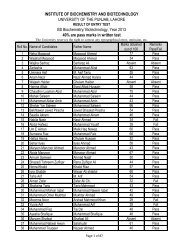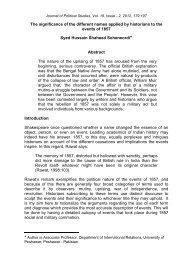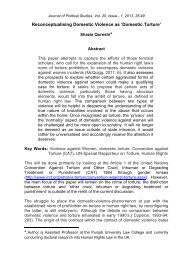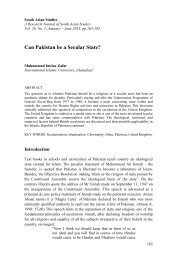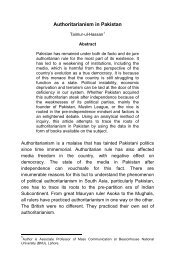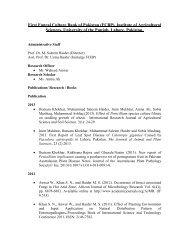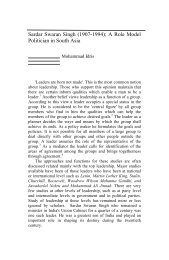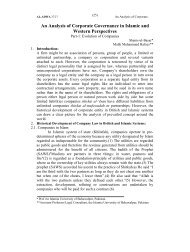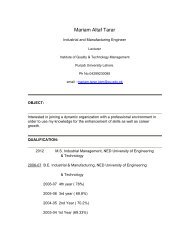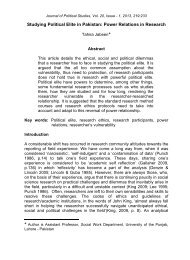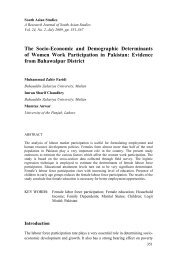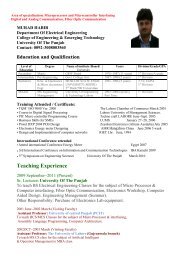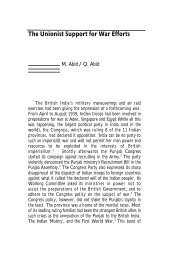To sir, with reverence - University of the Punjab
To sir, with reverence - University of the Punjab
To sir, with reverence - University of the Punjab
You also want an ePaper? Increase the reach of your titles
YUMPU automatically turns print PDFs into web optimized ePapers that Google loves.
Abdur Abdur Abdur Abdur Rahim Rahim Rahim Rahim Khan Khan Khan Khan Corner Corner Corner Corner<br />
Pakistan Journal <strong>of</strong> Library & Information Science, 12 (2011)<br />
Available at http://pu.edu.pk/home/journal/8<br />
Pakistan Journal <strong>of</strong> Library & Information Science<br />
ISSN 1680-4465<br />
<strong>To</strong> <strong>To</strong> <strong>sir</strong>, <strong>sir</strong>, <strong>with</strong> <strong>with</strong> <strong>reverence</strong>: <strong>reverence</strong>: A A humble humble tribute tribute to to Mr Mr A. A. Rahim Rahim<br />
*<br />
Mushtaq Mushtaq Ahmad<br />
Ahmad<br />
Department <strong>of</strong> Library and Information Science, <strong>University</strong> <strong>of</strong> <strong>the</strong> <strong>Punjab</strong>, Lahore, Pakistan<br />
Email: mushtaka@hotmail.com<br />
When thou shall stand <strong>with</strong> him face to face,<br />
Do not lift thine eyes;<br />
For sight is vain in that holy place,<br />
And <strong>the</strong> vision dies.<br />
Iqbal. Zabur-i Ajam<br />
(A.J. Arberry’s translation)<br />
It was <strong>with</strong> considerable hesitation that I accepted to write something about Mr A. Rahim when Mr<br />
Afzal Haq Qarshi approached me for this. Mr A. Rahim has been my chief, my teacher, my mentor, and<br />
my guide. I have always regarded him as my role model in pr<strong>of</strong>essional and personal life. It is very difficult<br />
to do justice to an undertaking like this when <strong>the</strong> subject is so venerable a personage as Mr A. Rahim.<br />
In this tribute to Mr A. Rahim and <strong>the</strong> role played by him as <strong>the</strong> leader <strong>of</strong> <strong>the</strong> pr<strong>of</strong>ession <strong>of</strong><br />
librarianship, in <strong>the</strong> <strong>Punjab</strong>, during its years <strong>of</strong> phenomenal growth and development, I will draw upon,<br />
firstly, his work as <strong>the</strong> <strong>University</strong> Librarian, Head <strong>of</strong> <strong>the</strong> Department <strong>of</strong> Library Science, and Registrar <strong>of</strong><br />
<strong>the</strong> <strong>University</strong> <strong>of</strong> <strong>the</strong> <strong>Punjab</strong>; secondly, my experience <strong>of</strong> working under his supervision for around sixteen<br />
years and that <strong>of</strong> being his student in <strong>the</strong> Department <strong>of</strong> Library Science during <strong>the</strong> 1963-1964 session;<br />
and, thirdly, my encounters and discussions <strong>with</strong> him during <strong>the</strong> period following <strong>the</strong> parting <strong>of</strong> our ways<br />
<strong>with</strong> my joining <strong>the</strong> Institute <strong>of</strong> Education and Research as its Librarian in January 1972.<br />
My association <strong>with</strong> Mr A. Rahim started in April 1956 (around a year after he had taken over as<br />
<strong>University</strong> Librarian), when I joined <strong>the</strong> <strong>University</strong> Library as what was <strong>the</strong>n known as Arabic-cum-Urdu<br />
Assistant. My job was to work in both Arabic Section and Urdu Section, which were separate at that time,<br />
and assist <strong>the</strong> semi-trained undergraduate pr<strong>of</strong>essional librarians holding charge <strong>of</strong> <strong>the</strong>ir respective<br />
sections. During <strong>the</strong> next ten years <strong>the</strong> <strong>University</strong> Library and <strong>the</strong> library science training facility run by it—<br />
called PULTC, i.e. <strong>Punjab</strong> <strong>University</strong> Library Training Class—were to see a miraculous transformation<br />
under <strong>the</strong> able guidance <strong>of</strong> Mr A. Rahim. In place <strong>of</strong> a heterogeneous pr<strong>of</strong>essional staff, in 1956, <strong>of</strong> five<br />
persons, some <strong>of</strong> <strong>the</strong>m not holding baccalaureate degrees—designated <strong>of</strong>ficially as First Assistant,<br />
Second Assistant and so on, <strong>the</strong> Library had by 1966 more than twelve trained graduate librarians. The<br />
library collection was growing more rapidly and <strong>the</strong> physical facilities and services had been greatly<br />
improved. PULTC, <strong>the</strong> oldest library science training facility in Asia (established in 1915 as library training<br />
class <strong>with</strong>in <strong>the</strong> <strong>University</strong> Library) had metamorphosed into a separately-budgeted university department<br />
(<strong>the</strong> Department <strong>of</strong> Library Science) in 1963, though <strong>the</strong> <strong>University</strong> Librarian remained <strong>the</strong> ex-<strong>of</strong>ficio head<br />
* Reprinted <strong>with</strong> corrections and minor additions. Originally published in Pakistan Journal <strong>of</strong> Library & Information<br />
Science (8), 2000, 1-8.
Mushtaq Ahmad / Pakistan Journal <strong>of</strong> Library & Information Science, 12 (2011)<br />
<strong>of</strong> that department for around ten more years. The PULTC trainees used to receive a certificate in library<br />
science until 1959, which year saw it being renamed diploma in library science. This was <strong>the</strong> period during<br />
which <strong>the</strong> Department <strong>of</strong> Library Science turned into an impressive teaching institution, most <strong>of</strong> its<br />
teachers holding <strong>the</strong> master's degrees in library science. At least three Fulbright pr<strong>of</strong>essors from <strong>the</strong><br />
United States had remained associated <strong>with</strong> <strong>the</strong> Department or <strong>the</strong> earlier PULTC—each in one different<br />
session—and done teaching work during this period. By 1973 <strong>the</strong> Department had been transformed into<br />
an independent teaching department <strong>with</strong> its excellent separate physical facilities and its foreign-trained<br />
teachers, one <strong>of</strong> <strong>the</strong>m holding a doctorate degree in library science from <strong>the</strong> United States, and was ready<br />
to start <strong>the</strong> second master's degree course in library science in <strong>the</strong> country. I do not know <strong>the</strong> extent <strong>of</strong> <strong>the</strong><br />
credit that goes to Mr A. Rahim for all this unprecedented development. Someone who has access to all<br />
<strong>the</strong> relevant records will someday shed light on this. Never<strong>the</strong>less, it can be said that <strong>the</strong> development<br />
took place during Mr A. Rahim’s tenure <strong>of</strong> <strong>of</strong>fice. Mr A. Rahim held <strong>the</strong> interests <strong>of</strong> <strong>the</strong> institution and<br />
pr<strong>of</strong>ession supreme and encouraged his subordinates to rise above him in respect <strong>of</strong> academic<br />
qualifications. I should add here for <strong>the</strong> record that he himself holds <strong>the</strong> master's degree (in English) from<br />
<strong>the</strong> <strong>University</strong> <strong>of</strong> <strong>the</strong> <strong>Punjab</strong> (through FC College, Lahore) and <strong>the</strong> Bachelor <strong>of</strong> Library Science degree<br />
from <strong>To</strong>ronto, Ontario, Canada, <strong>the</strong> latter being recognized as equivalent to <strong>the</strong> master's degree in library<br />
science by <strong>the</strong> American Library Association.<br />
When he took over as <strong>University</strong> Librarian, Mr A. Rahim found that <strong>the</strong> statutes relating to <strong>the</strong><br />
constitution and functions <strong>of</strong> <strong>the</strong> <strong>Punjab</strong> <strong>University</strong> Library Committee were framed in a way that <strong>the</strong><br />
Librarian was not even a member <strong>of</strong> <strong>the</strong> Committee; he was only ex-<strong>of</strong>ficio secretary. This gave <strong>the</strong><br />
Committee far too wide powers and denied <strong>the</strong> Librarian <strong>the</strong> status and authority which he deserved and<br />
which was required by him for <strong>the</strong> proper functioning <strong>of</strong> <strong>the</strong> Library. He was able to persuade <strong>the</strong><br />
authorities to rectify <strong>the</strong> situation. This was his first step towards <strong>the</strong> enhancement <strong>of</strong> status <strong>of</strong> librarians in<br />
<strong>the</strong> country. Later on, <strong>with</strong> <strong>the</strong> active support <strong>of</strong> his staff, he was able to convince <strong>the</strong> university authorities<br />
to amend and improve <strong>the</strong> entire structure <strong>of</strong> job designations <strong>of</strong> <strong>the</strong> librarians serving <strong>the</strong> <strong>University</strong> and<br />
to grant <strong>the</strong>m pay-scales comparable to, or better than, those being given to librarians in government<br />
service. The salaries <strong>of</strong> <strong>the</strong> pr<strong>of</strong>essional librarians in <strong>the</strong> <strong>University</strong> were thus brought on a par <strong>with</strong> those<br />
<strong>of</strong> <strong>the</strong> teaching staff.<br />
During his pr<strong>of</strong>essional career Mr A. Rahim actively participated in <strong>the</strong> affairs <strong>of</strong> <strong>the</strong> association <strong>of</strong><br />
librarians in <strong>the</strong> country, <strong>the</strong> Pakistan Library Association. With his academic background and<br />
pr<strong>of</strong>essional standing, it was not difficult for him to assume <strong>the</strong> leading position in <strong>the</strong> Association, in <strong>the</strong><br />
province and at times in <strong>the</strong> country. On many occasions he held a responsible <strong>of</strong>fice in <strong>the</strong> Association.<br />
On several occasions he held <strong>the</strong> top executive position in <strong>the</strong> Association. He is currently a life-member<br />
<strong>of</strong> <strong>the</strong> Association. During his working life he was a member <strong>of</strong> <strong>the</strong> Canadian Library Association and<br />
American Library Association. Pr<strong>of</strong>essional activities remained in full swing throughout his tenure, and<br />
numerous ga<strong>the</strong>rings were held from time to time, in addition to <strong>the</strong> annual conferences <strong>of</strong> <strong>the</strong><br />
Association, many sessions <strong>of</strong> which were presided over by him or enlivened by him <strong>with</strong> his wise<br />
comments.<br />
Mr A. Rahim has great executive talent. As an administrator he had an aura <strong>of</strong> awe about him. By<br />
<strong>the</strong> sheer force <strong>of</strong> his personality—by this word I mean "<strong>the</strong> sum <strong>of</strong> <strong>the</strong> patterns <strong>of</strong> thinking, feeling and<br />
behaving that are characteristic <strong>of</strong> a person"—he commanded great respect <strong>of</strong> his subordinates. He would<br />
make a round <strong>of</strong> <strong>the</strong> different sections <strong>of</strong> <strong>the</strong> <strong>University</strong> Library quite <strong>of</strong>ten. Usually he would pass by<br />
silently, but at times he used to ask what task was in hand. Occasionally, he could come at such odd<br />
hours as five minutes to closing time in <strong>the</strong> evening shift, thus cautioning his staff that <strong>the</strong>y could be<br />
checked at any time. No one from among <strong>the</strong> staff ever thought <strong>of</strong> absenting from duty <strong>with</strong>out permission.<br />
All staff members tried to give a good account <strong>of</strong> <strong>the</strong>mselves because <strong>the</strong>y knew that dereliction <strong>of</strong> duty<br />
would result in quick punishment. None was favored or enjoyed any special privileges. A personal<br />
instance would be in point here: though I was in his good books, I had to explain at length in writing why I<br />
refused to avail <strong>of</strong> <strong>the</strong> Colombo Plan scholarship after once having given my consent to my nomination as<br />
<strong>the</strong> principal candidate.<br />
As a teacher Mr A. Rahim was one <strong>of</strong> <strong>the</strong> most methodic. From among my teachers <strong>of</strong> library<br />
science, I found him <strong>the</strong> ablest in teaching technique. (It would be enlightening for some to know that he is<br />
<strong>the</strong> son <strong>of</strong> a teacher, and, as he once told me, it was on <strong>the</strong> advice <strong>of</strong> his fa<strong>the</strong>r that he changed his career<br />
from administration to librarianship.) In <strong>the</strong> class-room he used to have <strong>with</strong> him his well-prepared brief<br />
notes, from which he would talk at length, but not in such rapid-fire a way as to deprive <strong>the</strong> students from<br />
taking <strong>the</strong>ir own notes. Where some definitions and core descriptions were involved, he would not mind<br />
dictating <strong>the</strong>m. We never found him coming to <strong>the</strong> class unprepared and <strong>the</strong>n wasting time in talking <strong>of</strong><br />
2
Mushtaq Ahmad / Pakistan Journal <strong>of</strong> Library & Information Science, 12 (2011)<br />
extra-curricular matters. Throughout my life I have not come across a teacher who was so regular and<br />
punctual as Mr A. Rahim.<br />
<strong>To</strong> throw light on <strong>the</strong> personality <strong>of</strong> Mr A. Rahim, I would like to take <strong>the</strong> reader thirty years back in<br />
time and begin <strong>with</strong> <strong>the</strong> description <strong>of</strong> <strong>the</strong> replica <strong>of</strong> a large-sized painting that greeted <strong>the</strong> visitors who<br />
entered his <strong>of</strong>fice in <strong>the</strong> ground-floor corner <strong>of</strong> <strong>the</strong> Department <strong>of</strong> Social Work, at a few meters from <strong>the</strong><br />
old <strong>University</strong> Library building. This painting showed two central European kings (I do not recall <strong>the</strong>ir<br />
names and countries) <strong>of</strong> some past era standing face to face, one victorious in <strong>the</strong> war that had just ended<br />
and <strong>the</strong> o<strong>the</strong>r vanquished. The background showed <strong>the</strong>ir respective armies behind each king, <strong>the</strong> army <strong>of</strong><br />
<strong>the</strong> vanquished king shown utterly destroyed. The victorious king is shown leaning forward <strong>with</strong> an<br />
arrogant and contemptuous look on his face whereas <strong>the</strong> vanquished king is shown <strong>with</strong> his head held<br />
high and a defiant expression on his face. The writing under <strong>the</strong> painting read something like <strong>the</strong><br />
following:<br />
The victorious king: "Now what is left <strong>of</strong> your country, your army, and yourself?"<br />
The vanquished king: "My soul.”<br />
I have no doubt in my mind that this painting was put <strong>the</strong>re purposely. In its graphic<br />
representation and its few words, it gave to <strong>the</strong> visitor an idea- <strong>of</strong> what type <strong>of</strong> man he had come to meet:<br />
a man who would try to save his soul at any price, a man who would not compromise his principles under<br />
any circumstances. (In <strong>the</strong>se days <strong>of</strong> rampant corruption and self-serving people, most <strong>of</strong> us do not know<br />
how much price one has to pay at times to retain <strong>the</strong> captaincy <strong>of</strong> one’s soul—I for one know better than<br />
most o<strong>the</strong>rs.)<br />
The impression that Mr A. Rahim left (and still leaves) on his subordinate colleagues, his<br />
students, and those who have had any <strong>of</strong>ficial or private dealings <strong>with</strong> him is that <strong>of</strong> honesty, honor,<br />
dignity, decency, kindness, moderateness, and purity <strong>of</strong> heart and soul, on <strong>the</strong> one hand, and intelligence,<br />
intellectual ability, wittiness, and sagacity, on <strong>the</strong> o<strong>the</strong>r—<strong>the</strong> list could easily be extended. I do not recall<br />
ever hearing any principled man talking about Mr A. Rahim in a derogatory manner.<br />
Mr A. Rahim is well-known for his linguistic ability and precision. None <strong>of</strong> his peers in <strong>the</strong><br />
pr<strong>of</strong>ession <strong>of</strong> librarianship throughout <strong>the</strong> country or his contemporaries in <strong>the</strong> administrative staff <strong>of</strong> <strong>the</strong><br />
<strong>University</strong> could ever aspire to be his equal in respect <strong>of</strong> precise speech and writing, especially in <strong>the</strong><br />
English language. This precision has been his hallmark not only in his <strong>of</strong>fice notes and correspondence<br />
but also in his teaching work.<br />
The precision in his speech and writing reflects a very precise mind, from which springs his<br />
attention to detail, his seeing to it before undertaking any new venture that every needed element is in<br />
place, and his careful reading <strong>of</strong> <strong>of</strong>fice notes and letters before affixing his signature—things cited by his<br />
detractors against him. (Of course, I do not see even <strong>the</strong> need to give any exonerating remarks.)<br />
Mr A. Rahim never compromised his honor to <strong>the</strong> slightest degree. Once (in <strong>the</strong> early 1970s), in a<br />
light mood, Mr A. Rahim reminisced before me <strong>of</strong> an incident that had occurred when he was working as<br />
<strong>the</strong> Registrar <strong>of</strong> <strong>the</strong> <strong>University</strong> during <strong>the</strong> tenure <strong>of</strong> <strong>the</strong> late Pr<strong>of</strong>essor Hamid Ahmad Khan as Vice-<br />
Chancellor. I would repeat it here since it is relevant to <strong>the</strong> point in hand. Pr<strong>of</strong>essor Khan, while sitting in<br />
his <strong>of</strong>fice in <strong>the</strong> company <strong>of</strong> a friend, was going through some <strong>of</strong>ficial papers submitted personally by Mr<br />
A. Rahim. He came across something which did not catch his fancy, and he criticized Mr A. Rahim for that<br />
in <strong>the</strong> presence <strong>of</strong> his friend. Mr A. Rahim could not say anything in his defense because <strong>of</strong> <strong>the</strong> delicacy <strong>of</strong><br />
<strong>the</strong> situation. When Pr<strong>of</strong>essor Khan’s friend had left, Mr A. Rahim entered Pr<strong>of</strong>essor Khan’s room and told<br />
him that he had never accepted such treatment in his life nor would he do so in future, and that he would<br />
ra<strong>the</strong>r like to be repatriated to his original position, i.e. <strong>the</strong> <strong>University</strong> Librarian. Pr<strong>of</strong>essor Khan, though for<br />
once taken aback by this unexpected response from a subordinate, realized his mistake and expressed<br />
his regrets.<br />
Then Mr A. Rahim took out a certificate from a personal file and showed it to me. It was from<br />
Pr<strong>of</strong>essor Hamid Ahmad Khan. On reading it I found that Pr<strong>of</strong>essor Khan had developed a great liking for<br />
Mr A. Rahim. Since <strong>the</strong> certificate is a real piece <strong>of</strong> literature, I requested Mr A. Rahim to allow me to have<br />
its copy, which was granted and has been <strong>with</strong> me. This, in my humble opinion, is <strong>the</strong> most appropriate<br />
occasion to make this certificate public. I present it hereunder:<br />
3
Mushtaq Ahmad / Pakistan Journal <strong>of</strong> Library & Information Science, 12 (2011)<br />
SENATE HALL, LAHORE<br />
31 May 1968<br />
One <strong>of</strong> <strong>the</strong> most pleasant men to meet in <strong>the</strong> <strong>University</strong> is my friend Abdur Rahim Khan,<br />
<strong>the</strong> Librarian. I have known him for a much longer period than might appear from my<br />
<strong>of</strong>ficial connexion <strong>with</strong> <strong>the</strong> <strong>University</strong>. But <strong>the</strong> eighteen-year-old image <strong>of</strong> a suave young<br />
man anxious to uphold <strong>the</strong> daily decencies <strong>of</strong> civilized life has never tended to be blurred,<br />
or bleached, by <strong>the</strong> passage <strong>of</strong> time. Ra<strong>the</strong>r <strong>the</strong> contrary. The contours have become<br />
sharper, and <strong>the</strong> outline brighter, as <strong>the</strong> years have gone by. Even today you feel a glow<br />
<strong>of</strong> friendliness as Mr Rahim enters your room.<br />
In November 1965 an unexpected set <strong>of</strong> circumstances conspired to bring me and Mr<br />
Rahim much closer to each o<strong>the</strong>r than we ever had been before. Mr Rahim was asked<br />
temporarily to take over as Registrar, and I must confess that for a while I wondered if<br />
such a s<strong>of</strong>t-spoken and genial person as he could really prove equal to <strong>the</strong> exacting<br />
duties <strong>of</strong> an onerous and invidious position. All doubts were, however, dispelled as Mr<br />
Rahim’s integrity and courage rose splendidly to <strong>the</strong> occasion. This situation lasted for<br />
over ten months. Early in 1968 Mr Rahim again acted as Registrar, so that his services as<br />
Registrar were actually available to me for a total period <strong>of</strong> over a year. Throughout this<br />
time no personal equation projected itself into his <strong>of</strong>ficial advice to <strong>the</strong> Vice-Chancellor:<br />
he was always fearlessly au<strong>the</strong>ntic and unbiased in his presentation <strong>of</strong> facts.<br />
Ano<strong>the</strong>r quality which distinguishes Mr Rahim’s work as Registrar was his diligence. His<br />
was a strenuous job, but he never spared himself, and always put his work above<br />
everything else. His notes on <strong>of</strong>fice files were characterized by an unusual sensitivity to<br />
neatness. He picked his words carefully, and saw to it that what he wrote was clear and<br />
readable.<br />
After what I have said above, I need not, perhaps, add that Mr Rahim is a man <strong>with</strong> a<br />
strong sense <strong>of</strong> loyalty. He is a good colleague—affectionate and absolutely dependable.<br />
Signed<br />
(Hamid Ahmad Khan)<br />
Vice-Chancellor<br />
I dare not gloss what Pr<strong>of</strong>essor Hamid Ahmad Khan, one <strong>of</strong> our most illustrious and scholarly<br />
Vice-Chancellors, has said about Mr. A. Rahim; I, <strong>the</strong>refore, feel that I should hasten to conclude this<br />
humble presentation after adding a few more lines.<br />
Those who have known Mr A. Rahim since his leading a retired life after his return in 1984 from<br />
Jeddah, Saudi Arabia (where he had worked for around five years as a librarian in <strong>the</strong> Central Library <strong>of</strong><br />
King Abdulaziz <strong>University</strong> after seeking retirement from <strong>the</strong> service <strong>of</strong> <strong>the</strong> <strong>University</strong> <strong>of</strong> <strong>the</strong> <strong>Punjab</strong> in<br />
1978), know well a facet <strong>of</strong> his personality that had been dormant during his earlier life, that is his extreme<br />
piety.<br />
Mr A. Rahim has left his indelible mark in library development in this country through his teaching<br />
and guidance and by raising standards and setting examples worthy to be followed by all. His students<br />
and his students’ students are serving <strong>the</strong> nation in all corners <strong>of</strong> <strong>the</strong> country. On behalf <strong>of</strong> all his students,<br />
colleagues and friends and on my own behalf, I conclude this humble tribute <strong>with</strong> a salute to Mr A. Rahim,<br />
wishing him a very happy long life. May God be his Hami, Na<strong>sir</strong> and Muwaffiq, and also <strong>of</strong> those dear to<br />
him. Amen.<br />
4


